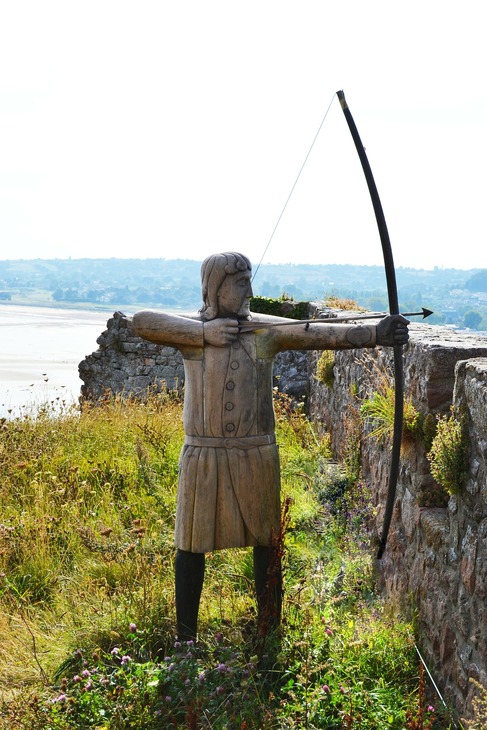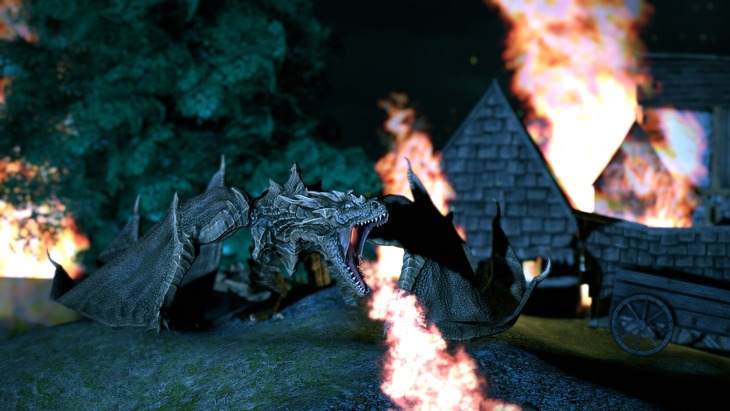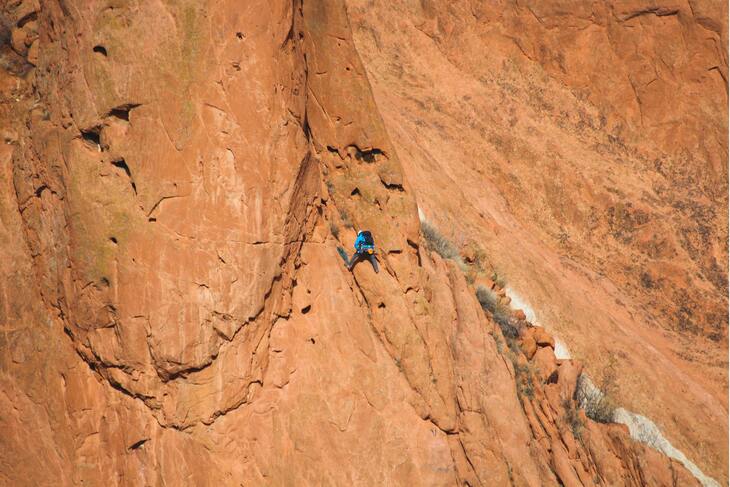While the Dwarves arm themselves with the armor of their ancestors, the Men of Lake-town prepare for war by practicing sword fighting in the square before the Great Hall. Amongst them hurries Gandalf on his way to meet and warn Bard about the army of Orcs which he has seen pouring out of Dol Guldur while he was caged above ground awaiting his own death.
The Man in charge
Gandalf: “Let me through! Make way!”
Alfrid: “No. No. Oi! You! Pointy hat! Yes. You. We don’t want no tramps, beggars nor vagabonds round here. We got enough trouble without the likes of you. Off you go. On your horse.”
Gandalf: “Who’s in charge here?”
Bard: “Who’s asking?”
In the same capacity he once had with the Master of Lake-town, Alfrid assumes the same position with Bard, fending off strangers whose presence is unwanted given the state of alarm and preparedness for war they are now involved in. Gandalf, in his haste and dismissal of Alfrid’s arrogant behavior, demands to speak to the Man in charge.
Since there is no more Master of Lake-town to speak of, the charge of the people of Lake-town went to the natural leader whose courage has destroyed their enemy.
Bard himself comes to face Gandalf and demands to know who he is to be asking about the leadership of his people.
The nature of Wizards
Gandalf: “You must set aside your petty grievances with the Dwarves. War is coming. The cesspits of Dol Guldur have been emptied. You’re all in mortal danger.”
Bard: “What are you talking about?”
Thranduil: “I can see you know nothing of Wizards. They are like winter thunder on a wild wind rolling in from a distance, breaking hard in alarm. But sometimes a storm is just a storm.”
Gandalf: “Not this time. Armies of Orcs are on the move. These are fighters. They have been bred for war. Our enemy has summoned his full strength.”
Hearing Gandalf mention an army of Orcs heading their way, fear covers his face as he contemplates what this will mean for his people and their survival. However, as soon as he does so, Thranduil diffuses Gandalf’s claim by rendering the speaker unreliable.
Since Bard has not met any of the five Wizards, he cannot come to any conclusion about the behavior of Wizards in general. However, his business relationship and respect for King Thranduil automatically makes his claims of the Wizard’s behavior truthful and reliable.
Bard now stands between the Elvenking whom he trusts and respects and a Wizard he has yet to trust claiming and counterclaiming each other. There is no way for him to find the truth of the matter. But there are questions that he can ask to see the reasoning behind the claims of the Wizard.
The big picture
Thranduil: “Why show his hand now?”
Gandalf: “Because we forced him. We forced him when the Company of Thorin Oakenshield set out to reclaim their homeland. The Dwarves were never meant to reach Erebor. Azog the Defiler was sent to kill them. His master seeks control of the Mountain. Not just for the treasure within but for where it lies, its strategic position. This is the gateway to reclaiming the lands of Angmar in the North. If that fell kingdom should rise again Rivendell, Lórien, the Shire even Gondor itself will fall.”
Thranduil: “These Orcs armies you speak of, Mithrandir, where are they?”
Bard has not known the big picture of the enterprise which the Dwarves have undertaken and the direction it should have taken. From this one company of Dwarves who were sent on their quest a global movement has been triggered. Objectively speaking, the Orcs led by Azog could have taken to the Lonely Mountain with or without the Dwarves in their path. They could have claimed the Mountain for themselves years ago. They would have had Smaug as their ally and Angmar would have already risen by now.
However, given the time Sauron needed to gain any kind of power and assemble an army to send to the Lonely Mountain, the Dwarves were already en route. It was a simple matter of killing them and claiming the treasure and the position for themselves.
With that not achieved, there is nothing else the Orcs can do but declare war against whoever stands in their way. Because of the Dwarves, now there stand Elves and Men against them instead of only thirteen Dwarves. An unpleasant, but nevertheless, solvable problem.
What Thranduil asks of Gandalf is fairly simple, given that he has not seen a single Orc cross his path other than the pack of an insignificant number of Orcs. Gandalf has seen the Orcs leave Dol Guldur but he cannot claim to know where the Orcs are headed and where they now are since he has not spotted them since he himself was imprisoned.
The Earth-eaters
Ragash: “Our army will be in position by dawn. The attack will be sudden and swift!”
Azog: “The fools! They have forgotten what lives beneath these lands. They have forgotten the great Earth-eaters.”
Whilst Thranduil does not believe in Gandalf’s predictions as he has not seen these Orcs move anywhere on the ground, the Orcs themselves have taken the underground tunnels bored by the strength of the Were-worms. They needed a way to surprise the armies of Elves and Men. Having the two armies see them approaching the mountain there would be no surprise and they could have easily been taken down.
The Were-worms serve them as a kind of transportation under the ground so as to remain invisible to all other races awaiting their arrival. With a surprise, the Elves and Men would have no time to prepare their ranks against the Orcs giving them the advantage on the battlefield.
The army of Gundabad
Tauriel: “If we are going in – we should move now. They are swarming.”
Legolas: “These bats are bred for one purpose.”
Tauriel: “For what?”
Legolas: “For war.”
Tauriel: “We must warn the others.”
Legolas: “We may be too late – hurry!”
Meanwhile Tauriel and Legolas still wait for the Gundabad Orcs to show their faces. As they see the giant bats swarming around the fortress, Legolas declares them to be birds of war. Gundabad Orcs begin to exit the fortress in ranks with Bolg watching their progress and stirring them forward. Now, the Orc armies have their troops on the ground, a special battalion in the air as well as allies under the ground.
Seeing the number of Orcs flowing out of Gundabad, Tauriel and Legolas leave their position to hurry to the Lonely Mountain and warn the others of their arrival.
Dwarves prepare
Dwalin: “Come on, let’s get those blades sharpened.”
Glóin: “Aye. Blasted Elves.”
Dwalin: “You swing an ax at it?”
Glóin: “No, brother.”
Dwarves prepare their weapons for the battle ahead as well as encouraging their anger at those they will meet the following day on the battlefield. They seem to be oblivious to the action that Bilbo is taking on his own. Their trust in him as that of Thorin appears to be as high as can be since they don’t appear to be concerned about his whereabouts giving credence to the fact that they consider him loyal to them as a company and thereby their cause.
While they prepare, Bilbo takes the rope to the gate, cautiously tying it through the steel ring in the stone.
Dark days
Bofur: “You should be inside. Out of the wind.”
Bilbo: “No, I needed some air. Place still stinks of dragon.”
Bofur: “The Elves have been moving their archers in position.”
Bilbo: “Ah.”
Bofur: “The battle will be over by tomorrow’s eve. Though I doubt we will live to see it.”
Bilbo: “No, these are dark days.”
Bofur: “Dark days indeed.”
Bilbo: “Hmm.”
Bofur catches Bilbo preparing the rope to climb down the gate on. However, he does not mention anything about it at first. Bofur uses this opportunity to convey his feelings of inevitable death to Bilbo. Seeing as how the rest of the Dwarves are preoccupied with anger toward Elves and preparing their weapons, it only seems logical for Bofur to speak to Bilbo who appears disinterested in that particular ritual.
Additionally, Bofur and Bilbo have already had a conversation in which they freely exchanged their feelings about the situations they found themselves in, and they both seemed to understand each other perfectly. It is then no wonder that Bofur would choose Bilbo to talk to among the thirteen of his own kind.
The atmosphere is glum as is Bofur’s prediction about the day ahead. Bilbo empathizes with him feeling guilt as he contemplates his own actions and their possible repercussions for the company. However, in order to give them a fighting chance at survival, he needs to execute his plan, no matter how guilt-ridden he might be.
Until the morning
Bofur: “No one could blame a soul for wishing themselves elsewhere. Must be near midnight. Bombur’s got the next watch. It’ll take a bit to wake him.”
Bilbo: “Bofur, I will see you in the morning.”
Bofur: “Goodbye Bilbo.”
Without directly pointing at the rope tied to the steel ring, Bofur addresses a wish of his own that may be the same wish that encouraged Bilbo to tie the rope in the first place. Bofur understands his want to leave on the eve of battle as he and probably all the rest of the Dwarves would gladly do the same were it not for loyalty to their leader.
Seeing as how Bilbo does not suffer from the same affliction as the Dwarves do to stand by their leader, Bofur offers Bilbo subtle help in escaping by staggering the change of guard of the gate.
Bilbo assures Bofur that he will be seeing him the next morning. Bofur does not firmly believe in that plan, for if he were in his position he would have taken to escaping Erebor himself. However, to explain the plan to Bofur in detail would put his entire enterprise into jeopardy, so Bilbo keeps it to himself, knowing that no matter what Bofur thinks will happen, he will be seeing him in the morning.
Follow me to my next post.
Featured image by Amanda Klamrowski on Unsplash





